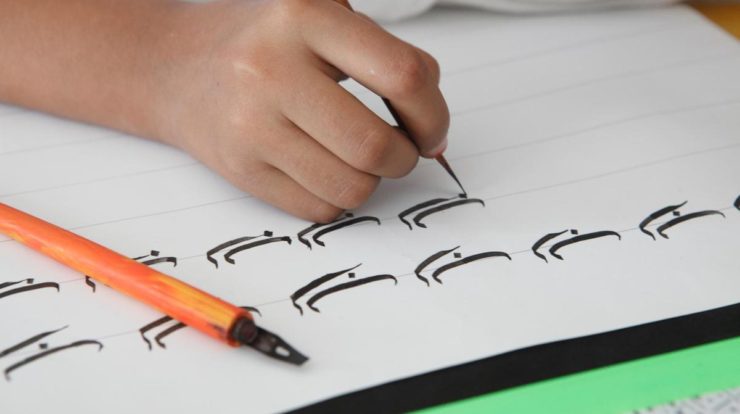
Arabic often tops the list of toughest languages to learn and even The Foreign Service Institute, the United States federal government’s primary training institution for American diplomats, claims that it takes around 2,200 hours (or 88 weeks or almost 2 years) of study time to achieve general proficiency.
The reason most often given for why Arab seems difficult is because it shares little with the languages of Europe. For example, when you learn Arabic writing, and even when you learn to read Arabic, you have to do it from right to left – totally opposite of most world languages. When it comes time to learn Arabic alphabet letters and their Arabic pronunciation, the letters are written completely different and contain a handful of unusual sounds that have no equivalent in English or other languages.
However, what would you say if I told you that the notorious difficulty of learning Arabic is, in fact, a myth and that it’s your own attitude and the way you view the language that really makes the difference in learning a language? Would you still be in doubt? Well, read on then and remove any doubts you may have as
we show you five secrets to learning Arabic easily and successfully.
- You’re Never Too Old to Learn
Maybe you’re one of those who laments, “Oh, I wish I would have studied Arabic when I was younger. It would have been so much easier to learn.” Actually, this is only partially true because, yeah, studies have shown that younger Arabic language learners seem to be more successful in acquiring the language, but it may not necessarily be due to age or age-related cognitive abilities; rather research has shown that successful Arabic language acquisition is a result of exposure to the language and the motivation to learn. And who has more opportunity to gain daily exposure than adults? With enough daily exposure and the drive to learn Arabic language skills, adults do just as well learning Arabic as younger learners of the language.
- “…And a Child Shall Lead Them.”
Just as you’re never too old to learn, children are never too young to teach us something, too. Children tend to learn their first language naturally and effortlessly, so maybe we can use a few these insights when it comes to learning Arabic. For example, before they ever speak aloud, children spend a lot of time absorbing language because they’re immersed in the environment that is conducive to learning their native tongue. Not only that, but while they are learning, they are quite comfortable in that learning role because they are not only learning language but learning to walk, climb, and a hundred other tasks as well.
Another thing we can learn about children is that they are naturally motivated to speak because it helps them talk to and interact others. They don’t worry so much about grammar rules as they do about getting their point across or getting that cookie that they want.
- Immerse Yourself in Arabic language and Arab Culture
While we are on the subject of children, we can note that not only exposure to Arabic is vital to learning the language, but so is immersion in the language and culture of Arabic speaking countries. In actual fact, research has shown that immersion has many cognitive benefits for those studying Arabic – benefits that those who only learn their mother tongue don’t receive. And in today’s world of modern technology and communications, consider yourself lucky if you’re learning Arabic as a second language because you don’t have to leave the comfort of your own home to immerse yourself in the language and culture. Thanks to the internet and mobile telephones you can watch Arab films, listen to Arab music, meet native Arabic speaking friends and chat with them, and even download Arab language apps to your mobile, all at the touch of a finger no matter where you are in the world.
- The Benefits Just Keep on Coming
Not only do you get benefits from being bilingual, but even the experience of learning Arabic also comes with some inherent advantages. For example, it will be easier for you to learn other language because you will recognize sound patterns across many other languages. It also can help stave off Alzheimer’s for a few more years as the process of learning Arabic stimulates your problem-solving and mental flexibility, resulting in better overall academic and cognitive performance.
- Learning Arabic is Totally Worth It
Arabic, like any language, is challenging at times and requires commitment, but it’s totally worth learning it. It isn’t about something on your CV that will make you more marketable or how much you can brag to your friends after chatting with the taxi driver in Arabic on your trip to Cairo because you decided to learn Egyptian Arabic. Rather, it’s about the rich and rewarding experiences you’ll have when you communicate and connect with others and become a more engaged citizen of the world.
So you see, Arabic really isn’t difficult at all and learning it comes with many benefits. If you’d like to learn more about Arabic language and Arab culture, then head over to kaleela.com and download the best way to learn Arabic – get the Kaleela Arabic language app for your IOS or Android mobile device. Check out our new course in Syrian dialect after you download it. It’s free!
Kaleela – learn Arabic the right way.
